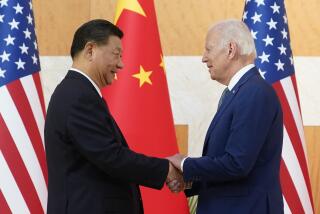An Obama and Rouhani handshake at the U.N. could mean a lot
NEW YORK -- It may be just a handshake, but in this case there would be nothing casual about it.
Such an act of familiarity between President Obama and Iranian President Hassan Rouhani would carry all kinds of meaning – at least for the international witnesses gathered at the United Nations General Assembly this week.
Though there have been signs that direct talks could resume after decades of estrangement between the two countries, U.S. diplomats have been wringing their hands over whether now is the right time for that symbolic act of warmth.
Even after the two leaders got to town and prepared for a day of meetings Tuesday, it wasn’t clear that they were planning to bump into each other at all.
Aides did not say as of late Monday whether a meet-and-greet would take place.
“We have no meeting scheduled with President Rouhani,” deputy national security advisor Ben Rhodes said Monday, but “we don’t rule out that type of engagement.”
If it all sounds just a little clinical, that’s the nature of diplomatic etiquette. Protocol teams carefully choreograph virtually every interaction among heads of state. The process operates something like an elaborate dance involving a ballroom full of people.
The details of every encounter speak to the relationship among the countries involved, confirming the strength of long-standing alliances and broadcasting new partnerships.
“Diplomacy has always been very status-conscious,” said Anthony Quainton, a former U.S. ambassador to Nicaragua, Peru, Kuwait and the Central African Republic and now a professor of U.S. foreign policy at American University. “People know their rank and relative importance by these protocols that have evolved over centuries.
“The physical relationship of presidents and kings matters,” he said, because “it explains the political relationship.”
A public snub can send a stern message, as Obama knows full well. He recently signaled his displeasure with Russian President Vladimir Putin by canceling a previously scheduled bilateral meeting. Putin then chose not to meet Obama at the airport when he arrived in Russia for a Group of 20 economic summit.
Obama was on the receiving end of a brushoff too, when Brazilian President Dilma Rousseff said this month that she would skip a planned state visit to the White House. Her complaint arose from the recent disclosure that sweeping U.S. surveillance operations included her and other officials in her country.
In the order of face-time protocols, Rousseff’s was the ultimate dismissal. Her invitation was for a state dinner, complete with white-tie dinner and toasts and a fete including full delegations and celebrities.
Moscow’s canceled session – a so-called “bilateral,” with a full complement of officials sitting in a conference room across from their counterparts – was one step down.
Visits with overnight stays denote more intimacy than day-chats. A session at someone’s residence ranks above one at a summit. The intimacy of the Chinese president’s summer stay with the president at a southern California resort signaled Obama’s personal openness to the new leader. But he wasn’t so open as to offer a double-date with the first ladies.
Handshakes are at the bottom of the order, but are noted with surprising regularity. Until China was admitted to the U.N., said Quainton, diplomats were under orders not to engage in that pleasantry with their Chinese counterparts.
If and when Obama shakes hands with Rouhani, Quainton said, people will read it as a sign that he believes the Iranians are ready to operate in good faith in talks about their nuclear program. That moment might not be now.
“If they shake hands, then both sides have signaled that this symbolic step might advance talks,” he said. “You don’t want to set expectations if nothing’s going to come of this.”
ALSO:
Kerry to hold highest-level U.S. meeting with Iran since 1979
Pussy Riot musician on hunger strike to protest prison conditions
Syria’s Assad vows compliance with chemical weapons deal, blasts U.S.
Twitter: @cparsons
More to Read
Start your day right
Sign up for Essential California for news, features and recommendations from the L.A. Times and beyond in your inbox six days a week.
You may occasionally receive promotional content from the Los Angeles Times.







